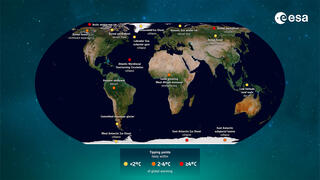This week, CRADALL Director Anna Wilson participated in the Global Tipping Points Conference at Exeter University, where the need for new learnings at all levels became increasingly apparent.
The Global Tipping Points Conference is organised by some of the world’s leading climate scientists—Professor Johan Rockström, Ricarda Winkelmann, and Professor Tim Lenton—and features cutting-edge research on the state of critical Earth systems (including the Antarctic and Greenland ice sheets, Pacific coral reefs, the Atlantic Meridional Overturning Current) and how close they are to the tipping points that may lead to collapse or new, unknown states. It also explores, with the help of leading social scientists, international governance figures, third-sector leaders, and campaigners, how social systems could be “tipped” onto trajectories leading to low-carbon futures.
The conference opened with stark news: it is already too late to save the world’s tropical coral reefs, with some models predicting that only 1% will survive expected rises in ocean temperature and changes in salinity. We also heard deeply concerning updates about the Atlantic Meridional Overturning Circulation (AMOC) – the ocean current that cycles warm and cold water across the equator and to the Arctic, and which is responsible for Scotland’s and the UK’s relatively mild climate. The latest modelling suggests that when the AMOC shuts down, winter sea ice could reach Scotland. Attendees were left to consider the profound implications this would have on our society and economy.
Other sessions focused on the social changes needed to avoid catastrophic outcomes. These included creating cities dominated by active and electrified public transport, decarbonising heating, and restructuring global food and agri-product systems so that small-holders are adequately paid, global diets are healthier and affordable, and supply chains are more robust and more localised.
Throughout the conference, it became clear that new kinds of learning are needed at many different levels.
Whether through changed climatic conditions or the sociotechnical changes made to abate them, change is coming. There is thus a real need for new kinds of learning that prepare people to live in their locally-specific futures. Dr Wilson’s presentation, Climate Imaginaries as Public Pedagogies, addressed this directly, describing ways of using place-based participatory speculative fiction to help people recognise what change might look like for them. She also stressed that the stories she described are also important resources for policy makers, business strategists, engineers and scientists to learn about the people who will be and are being affected by those changes and to understand their experiences, priorities and values – something that many of the conference presentations and discussions made clear was very much needed if we are to avoid new kinds of coloniality and achieve anything close to “justice” in our transitioning world.
Many of the changes described in the sessions focused on positive social tipping points will require new skills and newly and retrained workforces, whether to install the vast number of heat pumps that decarbonising heating in the UK will require, or to build the pipelines and other infrastructure needed for carbon capture and storage solutions, or to shift global farming to more sustainable practices.
It also became clear that there is a real and growing need for more interprofessional work, which in turn generates a need for new training and professional development. From the growing need for partnerships between farmers and environmental scientists, to a need for climate resilience planners to work with safety and policing experts, the mutual influence of previously weakly-coupled parts of our economy is growing ever stronger and more complex. And as insurance companies start to sue local and national governments for the losses they incur when e.g. severe flooding damages car plants (as we are seeing with the Toyota plant in KwaZulu-Natal), there is a need for planners and policy-makers to learn how to make big picture, holistic plans that take a range of risks into account for cities and regions.
There is also a need for scientists with expert but often highly technical knowledge to learn how to communicate that knowledge to better effect. This was the motivation for another session involving Dr Wilson. Motivated by the sense that when it comes to decarbonisation, we are in a fight against vested interests and what Distinguished Professor Marten Scheffer (Wageningen University) had described in his keynote presentation as “the invisible strangling hand”, Dr Wilson collaborated with Professor Iain Black and Emeritus Professor Gerard Hastings (University of Strathclyde) and digital campaigning expert Stewart Kirkpatrick (38 Degrees, Open Democracy, Yes Scotland) to run an action workshop on Lessons from Tobacco Control.
Recognising that the oil and gas industry and its dependent sectors will resist change at the speed and scale being called for by the scientists at the conference, Professor Black and team ran an action workshop examining how to increase our understanding of ‘deliberate dampening effects’ using the tipping points framework. The aim was to help participants learn how to recognise and counter the actions and strategies that are used to create negative feedback loops and slow down transitions. The workshop drew on lessons from Professor Hastings’ four-decade career in tobacco control and public health advocacy. The workshop activities will be further developed and will form part of the Positive Tipping Points Toolkit, to be launched in September.
Gallery images (click to enlarge):
Discussion topics:
- Log in to post comments















Latest Comments